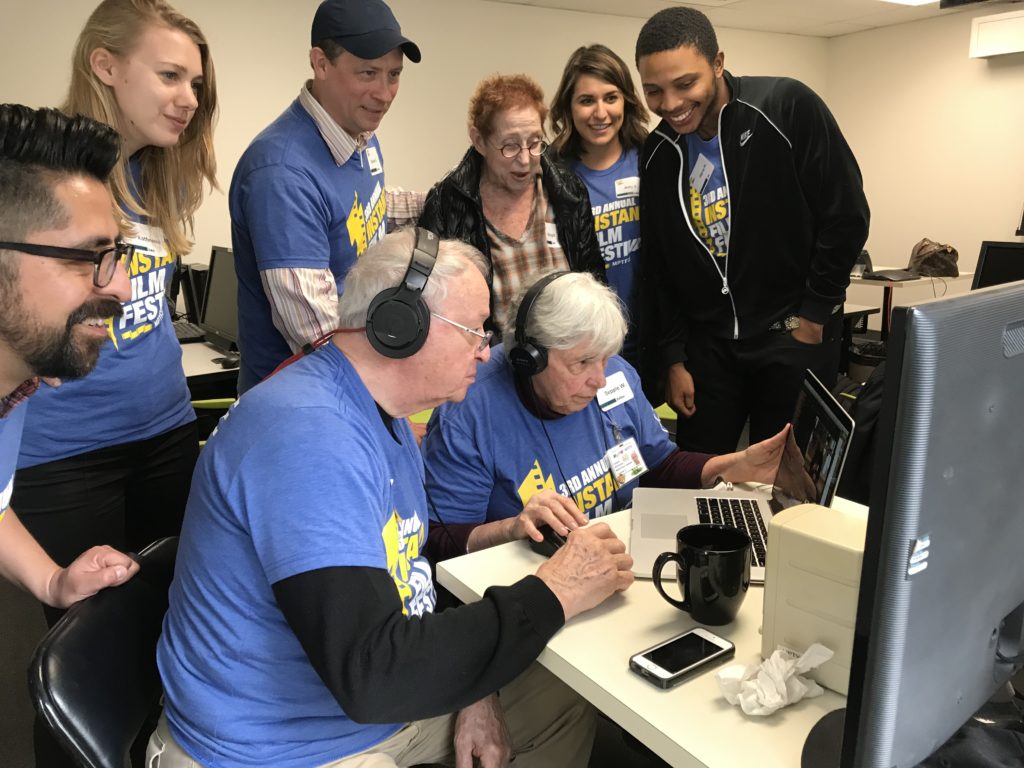
Motion Picture & Television Fund, Adobe Tools Keep Seniors Creative
When the pandemic started, the Motion Picture & Television Fund (MPTF) was faced with the dilemma of keeping its Los Angeles campus senior residents and volunteers healthy and physically distant while also finding ways for them to feel connected and pursue creative outlets.
MPTF, which has been supporting the entertainment community in times of need since its creation in 1921 as the Motion Picture Relief Fund, found one solution to its dilemma in its internal TV station, which is run by the campus residents and volunteers themselves.
The TV station became a resource for connection, entertainment and creativity for the seniors during a time that was especially isolating. It also created opportunities for the senior residents and volunteers to harness their creative talents and learn new skills with the help of Adobe Creative Cloud tools.
 Three volunteers’ stories
Three volunteers’ stories
One MPTF volunteer, Marijane Miller, told MESA she has been either volunteering or working for the Fund for over 20 years.
After working for five seasons in the “Criminal Minds” art department, a second volunteer, Adele Wilson, inspired staff with her ability to quickly learn how to edit content for the MPTF TV station.
And another volunteer, Deppie Wieseneck, became involved in the TV station and transformed her storytelling from her love of still photography into creating video content.
During her career, Miller managed standup comedians, worked for a digital marketing company, produced a children’s science show, and also worked on sitcoms, she said. In the last 10 years, she has been creating informational programming and is currently creating a documentary about the Performing Arts Center in San Luis Obispo in addition to her work with MPTF, she told MESA.
In summer 2020, the MPTF TV station project “went live for residents to keep them enthusiastic and engaged during the lockdown,” she recalled. “From ‘we’re going to play games and tell stories live every day,’” the project has grown to create “amazing, professionally produced content that involves the residents, volunteers and staff,” she said.
Jennifer Clymer, MPTF Studios producer, needed help with administration and brought Miller in to do paperwork, spreadsheets, thank you notes and research for the interviews she and residents were doing, Miller recalled. “I used Photoshop to create some of the materials they needed,” she said.
Miller is somebody who “would have lost their mind if I didn’t have this,” she told MESA, recalling: “I live in West Hollywood alone and I was in the middle of a documentary when the lockdown came.” There was no shooting happening at that point. “We did some remote editing but that was challenging since we couldn’t get together,” Miller said, noting “we stopped in about April or May [and] I had nothing to do” last year, when Clymer called her in June 2020 to help. “I said, ‘let’s go!’” and she was glad she joined in, noting “it’s a fun group of people and a fun community.”
It didn’t take long for Miller to learn how to use the Adobe tools, she said, recalling: “The digital marketing company I worked for needed me to create my own social media graphics. One of the guys walked me through Photoshop and I just started using it. Like other software, the more you use it, the easier it gets. You find tricks and watch tutorials. When it came to Premiere Pro, I did teach myself some of the basics because it was similar to what I had seen before. Paige, an employee at MPTF, answers my questions when I ask but she usually shares a video tutorial. I was helped and self-taught on both. I think that’s the key to any software: that it’s intuitive. I think anyone can learn Premiere Pro.”
Miller now uses Photoshop almost every day, including a lot at MPTF Studios, she said. Clymer asked her to learn Premiere Pro, telling Miller that if she loved Photoshop, she would also love Premiere Pro, Miller recalled. She learned it quickly “because editing software is so similar – you import a file, you drag it to the timeline, you squish it and stretch it out, you put in a fade in and a fade out and, badaboom, it’s a television show,” she said. “For me, it’s enjoyable and I like it because it’s not hard and you’re accomplishing something.”
There is a weekly resident of the week award at MPTF, which Miller built in Photoshop, she told MESA, adding: “It takes me all of three seconds because I have it set up as a template and you just plug in the name and award. That was fun for me. I’ve created art cards for videos, so other editors could use those for their videos.”
One of the programs she works on is called “Clymer Conversations,” a half-hour to hour-long interview featuring young entertainment industry professionals, she pointed out.
“It’s a way for the retirement community to get to know those who are following in their footsteps,” she said, explaining: “I edit the content for marketing and this was the first time I learned how to use Premiere Pro, after Jen’s encouragement. I go into Premiere Pro and I lift three sound bites and marketing takes those and uses those on all of the social media platforms. I also tidy up the interview, I fix the beginning, I make sure the title cards or intro is clean and sound is good. I watch the whole show and fix it if needed, make it look tidy. Since all of these interviews are on Zoom, I can move to a one shot so it’s not a two shot the whole time. For the live show it’s a two shot, but when it’s for the MPTF Studios YouTube channel, I can add a little variety and add close ups. I put in the closing credits and make sure it fades out cleanly and export it and post it on the YouTube channel.”
 Creating a sense of purpose
Creating a sense of purpose
In addition to her work on CBS’s “Criminal Minds,” Wilson said she worked on seven seasons of the Showtime TV show “Weeds,” as well as NBC’s “Parks and Recreation,” noting she has been working in TV for the last 25 years, previously as a set dressing buyer.
“I started volunteering at Channel 22 at the Motion Picture & Television Fund for two reasons: they make movies and” knew she would “one day be a resident at the home,” she explained, adding: “I saw it as an opportunity to continue making films and also as a way of building friends for the future.” Meanwhile, it also “gave me a regular thing and purpose to go to when there’s not much else you can do in the world when you’re locked up in your home,” she noted. “I think the TV station during the pandemic helps people feel less isolated. I know it helps me a lot to feel less isolated.”
It was “exciting” to find and start using “all these tools” from Adobe and that is the “addictive part,” she went on to say, explaining: “The more tools you find, the more you want to try them all out. What really inspired me to put the time into learning how to edit was how wonderful Premiere Pro is and all of the options. It’s a little overwhelming in the beginning, because there’s so much, but as you dig your teeth into it, it just becomes more and more exciting. Premiere Pro is awesome. It’s such a powerful program.”
A “great adventure”
Wieseneck’s background was in graphic design and visual art. “When I retired from my family business, I went back to school to learn what computing was all about. It was there that I was introduced to Photoshop and Illustrator,” she told MESA. “With my art background, I found it an especially wonderful fit to my interest in graphics, photography and the restoration of old photographs.”
She became a volunteer at MPTF and used those recently learned skills to assist the resident editor-in-chief, Bobbi Farrell, with computer formatting the Resident Gazette newsletter, Wieseneck said. Farrell was also asked to be on the board of the newly-formed Channel 22 and asked to attend the first board meeting to take notes and started helping at the station with Photoshop projects. “I decided to learn digital editing once I was exposed to it and would be able to use it at the station,” Wieseneck said, calling it a “great adventure.”
Separately, MPTF, along with Tyler Perry, was awarded the Jean Hersholt Humanitarian Award by the Academy of Motion Picture Arts and Sciences in April.
More recently, on May 23, MPTF held its fifth Instant Film Festival, an event that showcases intergenerational creativity. This year, because of the pandemic, it was held virtually. MPTF turned to the Editors Guild to help get the films turned around quickly using Adobe Premiere, according to Adobe.
